
One of the big philosophical debates in Christendom has been over the question as to whether we are genuinely free agents (Arminianism, Provisionism or Extensivism - the doctrine of Free Will) or whether everything has been predetermined by Yahweh beforehand, including our salvation or damnation (Calvinism - see Register B below). The choice we make between these two positions colours our entire perception of, and therefore, ultimately, our relationship with, both Elohim (God) and man.
Calvinists do not believe, ultimately, that Yahweh's Sovereignty extends to granting man the freedom to choose or reject salvation when it is offered them. They will choose salvation (or damnation) because Yahweh has already decided they will. They go through the 'motions' of 'being saved' (or 'being damned') on earth but in reality they never had any say in the matter. It's a big cosmic deception.

By extension, it logically follows (and is often born out situationally) Calvinism may be, and often is, used to justify absolute dictatorship in the affairs of men whether in the political or domestic arena. This is why the Frenchman John Calvin tolerated no dissent or contrary theological opinions in his headquarters in 16th century Geneva, Switzerland, and thought nothing of burning at the stake those who dared to voice another point-of-view. They were, after all, 'unsaveable' in his own mind for not accepting Calvinism, and must therefore (by twisted Calvinistic logic) have been amongst the predestined 'damned'.
In respect of heretic-burning, Calvinists were no different from the oppressive Catholic Church that the Protestants of the day sought, with only partial success, to reform. They were noted for their intransigence and intolerance of Catholics, Jews and for all other Protestants who were not allowed to live in the territories they controlled, the strongest being Scotland, Holland and Switzerland. Those that did risked almost certain execution.
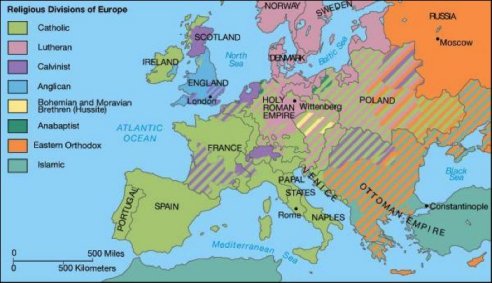 The religious divisions of Europe after the Reformation of the 16th Century
The religious divisions of Europe after the Reformation of the 16th Century
Calvinism represents a dark, totalitarian version of 'sovereignty' and a twisted view of love. Mercifully and happilly, the Bible represents another. The latter cause was first taken up by the Dutchman Jacobus Arminius (the Latin name for Jakob Hermenszoon) in Protestant times.
The late A.W.Tozer, a well-known and beloved 20th century Arminian preacher and expositor, whose books we heartily recommend, explains this contrary, biblical position succinctly, and shows how free will does not undermine Elohim's (God's) Sovereignty:
"God sovereignly decreed that man should be free to exercise moral choice, and man from the beginning has fulfilled that decree by making his choice between good and evil. When he chooses to do evil, he does not thereby countervail the sovereign will of God but fulfills it, inasmuch as the eternal decree decided not which choice the man should make but that he should be free to make it. If in His absolute freedom God has willed to give man limited freedom, who is there to stay His hand or say, 'What doest thou?' Man's will is free because God is sovereign. A God less than sovereign could not bestow moral freedom upon His creatures. He would be afraid to do so" (The Knowledge of the Holy).

Arminian and Calvinist concepts of Sovereignty in the realm of the Divine therefore represent, respectively, two substantially - if not entirely - different perceptions of Elohim (God) which affect the way important biblical terms are defined, like 'love', 'mercy', 'grace', 'kindness', etc.. By way of illustration, it should be noted that the Islamic god is described in their sacred literature as 'Merciful' and yet it soon becomes clear, by comparing the content of the Bible with the Quran, that the word has two very different qualitative and practical meanings. The Islamic view of 'mercy' is not at all like the Christian one - not remotely - though it may be said to have more in common with Calvinism than Arminianism.
The same may be said when comparing Arminianism and Calvinism. They are really two different types of gospel describing two different deities, though obviously they are similar in many other respects - sufficiently alike, because of a shared theological vocabulary, to make them both 'Christian' in the word's broadest definition but sufficiently different to make a separation between the two necessary. This is what, in our view, makes Calvinism, along with other groups who redefine the character of Elohim (God) through human wisdom and philosophy, an especially dangerous caricature, and therefore gross misrepresentation, of the Creator.
"Calvinists have the same
vocabulary [as
Provisionists]
but use a different dictionary"
- Leighton Flowers (Southern Baptist)
NCAY has been, and always will be, unreservedly Provisionist (see caption below) since its inception in 1987 and regards Messianic Provisionism as one of its non-negociable, fundamental tenets. It is compelled to do so because it defines the very nature of the 'Good News' or Besorah (Gospel) of Yah'shua the Messiah (Jesus Christ). It is an article of faith. To deny it is to cease being Messianic Evangelical.
Messianic Evangelicals follow, though not in every detail, in the footsteps of the great Arminian individuals and Arminian confessions of the past:
- 1. Jacobus Arminius (Dutch Reformed);
- 2. Johan van Oldenbarneveld (Dutch Reformed, executed by the Calvinists for heresy);
- 3. Hugo Grotius (author of De Jure Belli ac Pacis, a key work in the develolpment of International Law and called - sentenced to life imprisonment by the Calvinists);
- 4. Simon Episcopius (who systemised Arminianism - banished from the Netherlands by the Calvinists);
- 5. William Laud (Anglican Archbishop, executed by Charles I of England for, amongst other things, opposing Calvinism);
- 6. Lancelot Andrews (Anglican Bishop of Colchester);
- 7. John and Charles Wesley (the founders of Methodism);
- 8. The Anabaptists;
- 9. The Mennonites;
- 10. The Hutterites;
- 11. The Amish;
- 12. The Free Will Baptists;
- 13. The Seventh-Day Adventists; and
- 14. The Pentecostals.
Some of the great Arminians or Provisionists of our own age, all brilliant scholars whom we hold in the highest esteem, include such luminaries as:
- 1. Dr. N.T.Wright (Anglican Bishop and historian, along with other followers of the New Perspective on Paul);
- 2. William Lane Craig (an Evangelical Christian analytical philosopher and theologian);
- 3. C.S.Lewis (Anglican and prolific author);
- 4. A.W.Tozer (Christian & Missionary Alliance, a Protestant Evangelical group);
- 5. Dr.John Lennox (Professor of Mathematics at Oxford University and an Evangelical apologist);
- 6. Dr. Leighton Flowers (Southern Baptist theologian);
- 7. Dr. Ravi Zacharias (renowned Baptist philosopher);
- 8. Dr. Ben Witherington (Methodist scholar);
- 9. Dave Hunt (Plymouth Brethren);
- 10. Craig Keener (National Baptist);
- 11. Anthony Thiselton (Anglican);
- 12. Grant Osborne (Evangelical Methodist);
- 13. I.Howard Marshall (Evangelical Methodist);
- 14. Dr. James Leo Garrett Jr. (Southern Baptist);
- 15. Dr. David Allen (Southern Baptist);
- 16. Dr. Adam Harwood (Southern Baptist);
- 17. Dr. Norman Geisler (Southern Baptist Philosopher);
- 18. Ronnie W. Rogers (Southern Baptist); and
- 19. Leonard Ravenhill (Methodist).
Obviously, recognition by NCAY of all these great non-Calvinist Provisionist or Arminian men and confessions does not imply we support their every other doctrinal position. It should also be pointed out that there are Arminians (not to be confused with Armenians) who hold to some of the Calvinist doctrines (like the total depravity of man) and vice versa which we do not. So someone like Dave Hunt or N.T.Wright might find himself somewhere inbetween, Anglicans usually adhering to a mild form of Calvinism.
If you are looking for non-Calvinist Study Bibles and books (also see list at the end of this website), then the following are recommended:
- 1. NIV Student Bible;
- 2. NIV Study Bible;
- 3. Vines Expository Bible;
- 4. The Apologetics Study Bible;
- 5. The Complete Biblical Library, OT & NT sets, 40 vols.;
- 6. Word Pictures in the New Testament, 6 vols., Archibald Thomas Robertson;
- 7. An Exposition of the Four Gospels, 4 vols., Hershel H.Hobbs;
- 8. The People's New Testament with Explanatory Notes, B.W.Johnson; and
- 9. The Foundation of Augustianian Calvinism, Dr.Ken Wilson (leading scholar on Augustine);
If you want to read the early Church fathers, whose teachings oppose a Calvinistic soteriology, then check up:
- 1. Clement of Rome (AD 30-100);
- 2. Ignatius (AD 30-107);
- 3. Barnabas (AD 100);
- 4. Justin Martyr (AD 110-165);
- 5. Tatian (AD 110-172)
- 6. Irenæus (AD 120-202);
- 7. Tertullian (AD 145-220);
- 8. Clement of Alexandria (AD 153-217);
- 9. Origen (AD 185-254);
- 10. Hippolytus (AD 170-236);
- 11. Novatian (AD 210-280);
- 12. Archelaus (AD 277);
- 13. Alexander of Alexandria (AD 273-326); and
- 14. Lactanius (AD 260-330)
Messianic Evangelicals subscribe, and with only slight differences, to the Statement of Faith of the Society of Evangelical Arminians, which represents the views of all Arminians of different stripes. This we have modified with messianic terminology. Additions or substitutions are marked in bold text and omissions are marked [...], respectively:
- 1. We believe the Scriptures as originally given by Elohim (God), both Old and New Testaments, to be the inspired Davar Elohim (Word of God), infallible in their original autographs, entirely trustworthy, and the supreme authority in all matters of emunah (faith) and conduct;
- 2. We believe in one Elohim (God), Creator of all things, infinitely perfect, and eternally existing in three persons: Father, Son, and Ruach haQodesh (Holy Spirit), who possesses perfect and exhaustive knowledge of the past, present, and future, and who preserves, regulates, governs and directs all things so that nothing in the world happens without either His causation or permission. Elohim (God) is the author of good but not of evil. Yet even evil is governed by Elohim (God) in that Elohim (God) limits it and directs it to an end fitting with His overall plan and purpose;
- 3. We believe that Yah'shua the Messiah (Jesus Christ) is fully Elohim (God) and fully human, having been conceived of the Ruach haQodesh (Holy Spirit) and born of the Virgin Mary. He lived a sinless life, dying on the cross as a substitute and sacrifice for sinners. He arose bodily on the third day and ascended to the right hand of the Father. He will return personally and visibly at the end of the æon (age) to fully establish Elohim's (God's) Kingdom;
- 4. We believe that part of the ministry of the Ruach haQodesh (Holy Spirit) is to glorify the Master Yah'shua the Messiah (Lord Jesus Christ) and, during this æon (age), to convict sinners, enable them to believe, regenerate the believing sinner, and indwell, guide, instruct, and empower the believer for godly Torah living and service;
- 5. We believe that humanity was created in the image of Elohim (God) but fell from its original sinless state through willful disobedience and Satan's deception, resulting in æonian condemnation and separation from Elohim (God). In and of themselves and apart from the grace of Elohim (God) human beings can neither think, will, nor do anything good, including believe. But the prevenient grace of Elohim (God) prepares and enables sinners to receive the free gift of salvation offered in Messiah and His Besorah (Gospel). Only through the grace of Elohim (God) can sinners believe and so be regenerated by the Ruach haQodesh (Holy Spirit) unto salvation and spiritual life. It is also the grace of Elohim (God) that enables believers to continue in emunah (faith) as well as good in thought, will, and deed, so that all good deeds or movements that can be conceived must be ascribed to the grace of Elohim (God);
- 6. We believe that the shed blood of Yah'shua the Messiah (Jesus Christ) and his resurrection were provided for the salvation of all people, but are effective only for those who believe. Messiah's death and resurrection provide the only ground for justification and salvation, and only those who believe in Yah'shua the Messiah (Jesus Christ) become born of the Ruach haQodesh (Holy Spirit) and thus become children of Elohim (God);
- 7. We believe that Elohim's (God's) saving grace is resistible, that election unto salvation is conditional on emunah (faith) in Messiah, and that persevering in emunah (faith) is necessary for final salvation; and
- 8. We believe in the bodily resurrection of the dead; of believers to aeonian blessedness and simcha (joy) with the Master; and of unbelievers to judgment and æonian punishment in Sheol (hell).
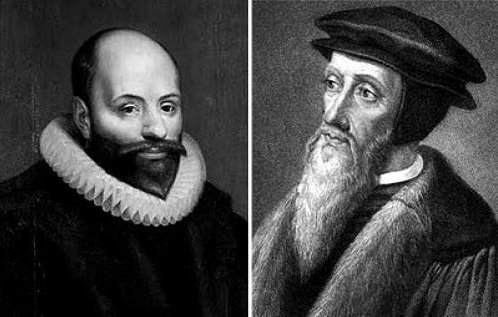 Arminius (left) and Calvin (right)
Arminius (left) and Calvin (right)
This stands in stark contrast to the creed of Calvinists (who believe that Calvinism is the gospel) which consists of the five major doctrines (known by the acronym TULIP):
- 1. Total depravity - but not, as Scripture teaches, if you believe in prevenient grace that gives everyone the opportunity to respond to the grace of Elohim (God)
- 2. Unconditional election - not what the Bible teaches which says that Israel is the elect people of Elohim (God) which in the New Covenant is those who are in Messiah Yah'shua (Jesus) ... and as far as individuals are concerned, you can, by choice, either be 'in' or 'out';
- 3. Limited Atonement - yes, atonement is limited, but who limits it? Is it Elohim (God) before the foundation of the world (Calvinism) or is it our response that decides whether we benefit from the Atonement or not? The Bible says the latter;
- 4. Irresistable Grace - no, that would be Elohim (God) making us an offer we can't refuse, a denial of free agency (will) ... grace is resistable and people resist it all the time; and
- 5. Perseverence of the Saints - in other words, 'once saved, always saved'. However, Scripture teaches that you are not eternally secure until you are secure in eternity. Scripture is full of examples of those who "have shipwrecked their faith" (1 Tim.1:19, NIV). As John Wesley correctly pointed out, "You cannot make shipwreck of something you never had in the first place." If you're not sailing on the boat (because Elohim (God) didn't predestine you), how can you shipwreck the boat? You are, by Calvinistic definition, already shipwrecked because the Calvinist god already decided you would be even before you were born. The truth is, there are scriptures about committing apostacy which is a willful rebellion against the emunah (faith) which you have had and did trust Yahweh with. Therefore you can choose salvation and choose to walk away from it.
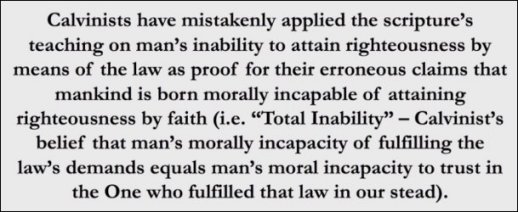
There are many stripes of Calvinist just as there are of Arminian. Indeed, the classical Arminians believed, like Calvinists, in the total depravity of man. Some still do, but not all. Likewise, not all Calvinists believe in all the 5 Points even though in practice you cannot have one without all the others. So, as Messianic Provisionists, it should come as no surprise that we differ in a number of points with other Arminians.
Calvinism is a form of fatalism and at complete variance with the teachings of the Bible. In it man has no real choice to follow Messiah or be saved because the god of Calvinism has already decided in advance who to save and who to torture in hell for eternity. The process of 'conversion' in mortality then becomes mere theatre. Arminius put it this way:
"While, therefore, the fate of the Stoics may not be presented in your doctrine, yet a fate is presented, which places a necessity upon all things, and takes away freedom".
By contrast, commitment to follow Yah'shua (Jesus) in Scripture requires a genuine decision of the mind followed by an act of the will:
"Yah'shua (Jesus) called out to them, Come, be My talmidim (disciples), and I will show you how to fish for people!' And they left their nets at once and followed Him" (Mt.4:19-20, NLT).
Commitment to Yahweh manifests itself in obedient trust (Ps.37:5-6; Prov.3:5-6), is costly (Lk.14:26-28), and requries suffering (Dan.3:14-18). It requires the exercise of the complete will of the soul in sacrificial giving (Rom.12:1-2) - the choosing is not done by Elohim (God), whether in part, or in whole. Without the exercise of free will there is no authentic ahavah (love) and therefore no genuine loyalty, which might indeed suit those making a pretense of these things and looking for excuses not to make real heart commitments as opposed to mere mental assent. Calvinism offers them an intellectual excuse to avoid that responsibility by offering a robotised or programmed impersonation of love. This may explain why many Calvinists love to mock Arminians (accusing them of being 'too feeling-based') and why many of them have such a harsh, unfeeling and ungraceful spirit:
"The last thing the accursed person will hear when they take their first step into hell, is all of creation standing to its feet and applauding God because God has rid the earth of them" (Paul Washer, Calvinist).
Contrast this with the true heart of Yahweh:
"Say to them: 'As I live,' says Yahweh-Elohim, 'I have no pleasure in the death of the wicked, but that the wicked turn from his way and live. Turn, turn from your evil ways! For why should you die, O house of Israel?'" (Ezek.33:11, NKJV).
If they were doomed from the beginning, why even call them to repentance? Yet clearly they do not have to perish. They have a choice - a real one - to make teshuvah (repent).
Calvinism focuses on issues that can cause anxiety, such as, 'Am I really elect? What if my theology is wrong? Does God really love me?' They essentially re-engage the question of personal depravity and guilt after the person has received forgiveness. They say, essentially, 'Calvinism shows why God loved you. You were one of the elect.' Therefore, it presents a security for the person by saying, 'God always did love you specifically (and maybe not the other person) even before the foundation of the world. Indeed, the Calvinist comes to believe that he was always (eternally) secure, even before he believed. It is a very appealing doctrine but it's a lie.
The truth is that only Yah'shua (Jesus) is Elect, and we are only elect if we are "in Him". And that's a choice everyone has to make of their own free will.
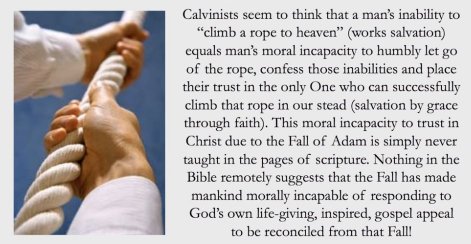
The true Besorah (Gospel) entails the very real risk of gaining or losing everything. Not so in the Calvinist universe where those who become saved cannot help but get saved, and where those who are predestined to damnation have no real opportunity to repent and be saved. Who would dare - or even could - resist the will of such a malevolent and capricious deity?
I know a woman who converted to Calvinism who has an Arminian husband. Because he refuses to accept Calvinism she is forced to wonder if he was ever really saved before and maybe if he is one of the eternally damned. She can't make a determination based on the fruit he is producing because she knows of faithful, loving, fruit-producing Calvinists who subsequently abandoned Calvinism. Now she wonders if those ex-Calvinists were ever saved. Fellow Calvinists say his abandonment of Calvinism is proof he was not one of the elect and is damned to eternal hell. But how can she know? How should she now apply Yah'shua's (Jesus') words?
"Every tree that does not bear good fruit is cut down and thrown into the fire. Thus, by their fruit you will recognise them (as true talmidim/disciples)" (Matt.7:19-20, NIV).
The Calvinist is forced to employ all sorts of intellectual contortions to justify continuing to believe his version of 'election'. Even a loving disposition, which is a fruit of the Ruach (Spirit), can no longer be a criterion for identification of a true believer. For, you see, Calvinism is the gospel by their estimation, and if someone is no longer a Calvinist, then they can no longer be living the gospel ... or be saved (or 'barely saved', as some 'generous' Calvinists classify Arminians and other non-Calvinists). After all, the ex-Calvinist was a loving person and remains one. Is he now one of the wicked, doomed to eternal torture?
Believers are known by their ahavah (love) and their fruit. What does that fruit look like? "...love, joy, peace, patience, kindness, goodness, faithfulness, gentleness and self-control" (Gal.5:22-23, NIV).
If a man has no real will then he cannot submit to Elohim (God) of his own free choice (Jas.4:15) then he cannot resist Elohim's (God's) will as far as his own personal choices and actions of following Messiah are concerned. Yahweh's will is, of course, irresistable as far as the overall destiny of peoples, nations, and the world are concerned (Rom.9:19) but that concerns the collective rather than the individual. He creates and destroys nations and determines the world's overall destiny according to a wise Plan. The part man plays in that world is to a very large extent his own choice, even if there are obviously boundaries and limitations.
Provisionist theologian and philosopher William Lane Craig makes the argument that if someone affirms determinism, then they too have to conclude that the reason they affirm determinism is that they were determined (predestined) to do so.

If they conclude that they only affirm determinism because they were determined (predestined) to do so, then they have to conclude that it wasn't rational deliberation and weighing of facts and logic that brought them to that affirmation, so their decision to affirm determinism has no rational basis whatsoever.
If they conclude that their affirmation of determinism has no rational basis, then they should reject determinism. Determinism is therefore irrational.
Provisionism/Arminianism is a reclamation of the early Messianic Community's (Church's) theological consensus which, in summary, rests on the following truths:
- 1. Salvation (and condemnation at the Day of Judgment) is conditioned upon the graciously enabled faith (or unbelief) of man;
- 2. The Atonement is qualitatively adequate for all men but is ultimately limited in mortality to those who trust in Yah'shua the Messiah (Jesus Christ);
- 3. Man has no divine saving grace (undeserved loving kindness, unmerited favour) of himself;
- 4. The Grace of Yahweh is the beginning, continuance, and accomplishment of any good he may do, yet he may resist the Ruach haQodesh (Holy Spirit); and
- 5. Believers are able to resist sin through Grace, and Messiah will keep them from failing; nevertheless, they are not beyond the ultimate possibility of forsaking Yahweh and may ultimately choose to do so, becoming devoid of Grace and in consequence capable of losing their salvation.
Calvinism is a misrepresentation of the Elohim (God) of the Bible, has given atheists an excuse not to believe in Him, and believers influenced by Post-Modernism to embrace lawlessness and unaccountability. It is a libel against Yahweh's character, denying His ahavah (love) for all men and women. It insists that He does not make salvation available to all because He does not want all to be saved.
The Besorah (Gospel) is "the power of Elohim (God) for salvation to everyone who has emunah (faith)" (Rom.1:16, NRSV), is "good news of great simcha (joy)", not just to a certain elect group of people, but "for all the people" (Lk.2:10, NRSV). The almost fanatical insistence that only a select group have been elected to salvation is not "good news of great simcha (joy)" - it is very bad news and it is unbiblical.
To be fair to Calvinists, the original impetus that led to the development of TULIP was to avoid any suggestion that salvation was somehow, in the last analysis, dependent on human will, effort or achievement. And, of course, it isn't. Salvation is by emunah (faith) alone and not by any work of man. (But also see Justification). The issue with Calvinism stems from a wrong understanding of the meaning of the word election. What, then, is Biblical Election? Seen from an Israelite perspective, as the New Testament must be, election is:
"...the choice, by the one God, of Abraham's family, the people known historically as 'Israel' and, in Paul's day, in their smaller post-exilic form, as hoi Ioudaioi, 'the Jews' or 'the Judeans'. The word 'election', as applied to Israel, usually carries a further connotation: not simply the divine choice of this people, but more specifically the divine choice of this people for a particular purpose" (N.T.Wright, Paul and the Faithfulness of God, Parts III & V - SPCK, London: 2013, p.775).
Thus when Yah'shua (Jesus) said, "You did not choose Me, but I chose you" (John 15:16a, NIV), he was not talking about choosing His talmidim (disciples) 'to be saved' without their consent or free will; rather it was an "appoint[ment] (calling, choosing, election, purpose) to go and bear fruit that will last" (v.16b, NIV). Salvation must be chosen by the individual, of his own free will, but his calling, choosing, appointment, election, or purpose is to "go and bear fruit that will last". Once you are saved, you are under obedience - you are not your own. In other words, we are to become a living incarnation for all the world to see Messiah at work within saved individuals. That is our election. That is what we are called to do. It is the same reason Israel was called because Messianic Israel is the continuation of that original calling to Abraham. We are to be a people - a nation - on display so that lost souls may be drawn to Messiah in us to so seek Messiah and accept His offered salvation. It is not our doctrinal correctness that will attract them. He "draw[s] all men" to Himself by attraction, not force (John 12:32, NIV). And notice, it is "all" who are attracted, not just the 'some' predestined to salvation. It would a perverse sort of saviour to attract the wicked and then reject them because they are already predestined to rejection and destruction. That would be a bit like a spider attracting its prey to then devour it. And what parent with a heart would ever do that to his child! Only the hard-hearted and cruel.
Calvinism veered off down a false road over the misunderstanding of one word - ELECTION - and then created a 'tough' doctrine. 'Tough is fine if that's what you want to base your spiritual reality on but hearts are known to shrivvel and die under such a régime.
It is not for nothing that in the English language we have the expression, "the road to hell is paved with good intentions". The intention - to counter the Catholic heresy that we are in some sense saved by our works - was a good one but it took a wrong turning, as so many theologies do. And though we are accused of teaching a works-based salvation, Messianic Evangelicals absolutely believe, with all Protestants, that:
"For by grace (unmerited love, undeserved loving-kindness) you have been saved through emunah (faith), and that not of yourselves; it is the gift of Elohim (God), not of works, lest anyone should boast" (Eph.2:8-9, NKJV).
We cannot earn our salvation from sin and death but we can, and do, earn our rewards. All salvation or deliverance is by trusting or emunah (faith) but there are different kinds of salvation in Scripture. For example, there is:
- 1. Salvation (deliverance) from enemies in battle leading to victory through trusting Yahweh;
- 2. Salvation (deliverance) from physical bondage (as from Egypt) leading to freedom and independence through trusting Yahweh;
- 3. Salvation (deliverance) from physical illness leading to physical healing through trusting Yahweh; and
- 4. Salvation (deliverance) from sin and death to inward purification and resurrection through trusting in the atonement of Messiah.
Clearly there are two broad categories of 'salvation' or 'deliverance' here: #1-3 and #4
Where we differ with orthodox Christians (Catholic, Eastern Orthodox and Protestant) is that we believe that:
- 1. There are three different grades, glories or 'salvations' in the eternities - two for the saved (in the classical, Protestant sense) and one for the unsaved who pass out of this life into the next one or aeon (1 Cor.15:41-42); and
- 2. The unsaved are eventually 'saved' or 'delivered' from their deserved punishment in hell but not to the Kingdom of Heaven which belongs exclusively to those to trusted in Yah'shua (Jesus) while on earth. We do not believe in eternal torment or annihilation. All are therefore 'saved' or 'delivered' in one sense and are appointed different rewards based on their works. Thus those 'saved' or 'delivered' out of hell do not receive salvation so on the same basis as those who were 'saved' or 'delivered' in mortality since there was no 'trusting' on the part of the wicked of Elohim's (God's) grace. They are not, therefore, "saved through emunah (faith) through grace" but are 'saved' or 'delivered' by punishment leading them to understanding and then "by grace" in the Cosmic Jubilee but not to the same glory.
Thus we must be careful to properly understand the different ways our English words 'elect' and 'saved' are used. There are different categories. It is their over-simplification that has led to such confusion and division in the Body of Messiah and to some horrendous doctrines advanced to try and make sense of Scriptures which don't otherwise seem to 'fit' because of a misunderstanding of words and cartegories.
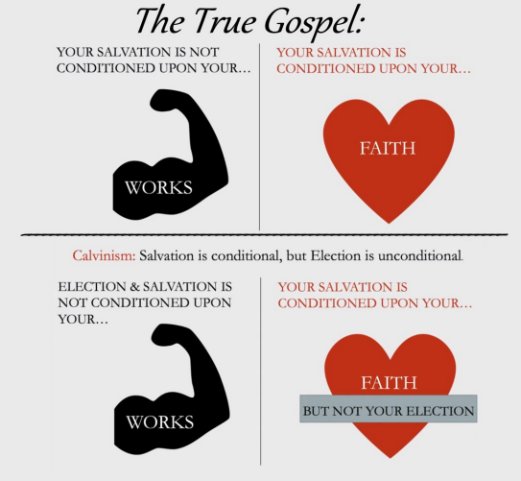
Messianic Evangelicals are always concerned about the misrepresentation by any group of the ahavah (love) of Elohim (God). For if 'you ain't got love, you ain't got nothin'. Our Elohim (God) does not predestine billions of souls to eternal torture (or annihilation) while withholding from them any opportunity to understand or believe the Good News. One can only wonder how many unbelievers have rejected Elohim (God) because of this deplorable distortion. This is not 'Good News' - it is terrible news and bespeaks a capricious entity worse even than the gods of the pagans. It is pagan!
"What shall we say then? That Gentiles, who did not pursue righteousness, have attained to righteousness, even the righteousness of faith; but Israel, pursuing the law of righteousness, has not attained to the law of righteousness. Why? Because they did not seek it by faith, but as it were, by the works of the law. For they stumbled at that stumbling stone" (Rom.9:30-32, NKJV).
Observe that Paul is not denouncing the pursuit itself. He is denouncing the manner or motive of that pursuit. Is righteousness being pursued by works (deeds) or faith (trusting)? Are you running after the Torah (Law) to make you righteous or are you running after Messiah to make you righteous? People are responsible to will and to run (1 Cor.9:24; 2 Tim.4:7), but if they do so according to the Torah (Law) and/or the flesh they will never finish the race. They will not attain their goal. If, however, they pursue righteousness by emunah (faith, trusting) in the only righteous One, they will attain it by grace - the undeserved loving-kindness of Elohim (God).
We live the Torah-lifestyle, as commanded, not to earn salvation but in grattitude for salvation as obedient servants...which is also the evidence of our salvation.
Therefore Messianic Evangelicals unhesitatingly and unapologetically reject the false gospel of Calvinism. We want no part of it. Nevetheless, for love's sake, and for truth's sake, we have created a number of articles in the registers below to help Calvinists come out of their cult and be truly saved.
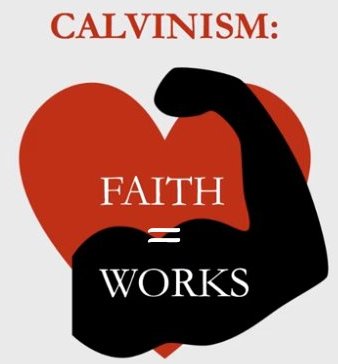
(1st edn. 26 September 2018 | 2nd edn. 22 June 2019 | 3rd edn. 23 September 2019 |
4th edn. 28 January 2020)
"Free agency is a fundamental law
of the Gospel and must be
respected at all times"
(Olive Branch 110:15; cp. 136 & 184)
|


